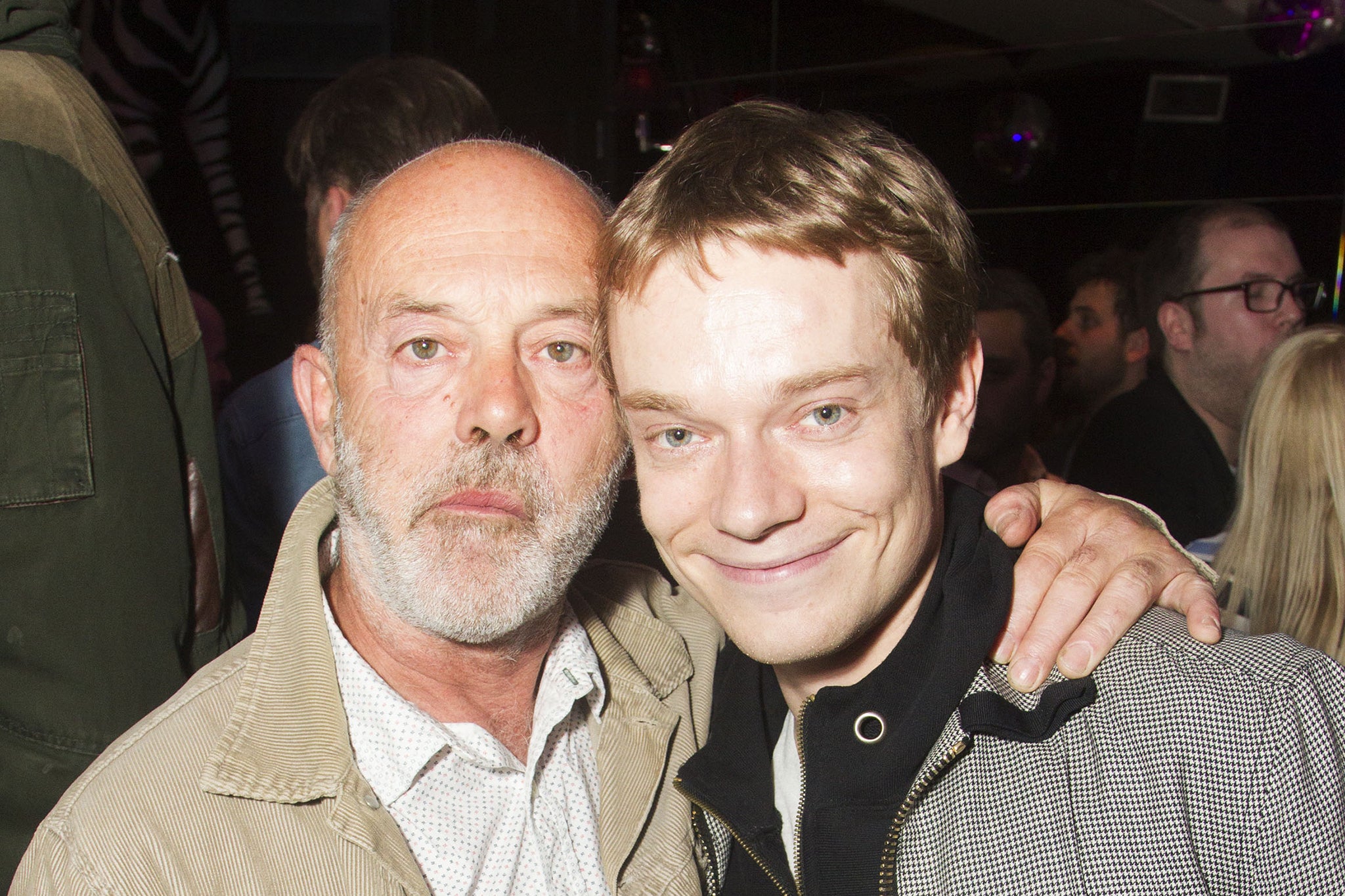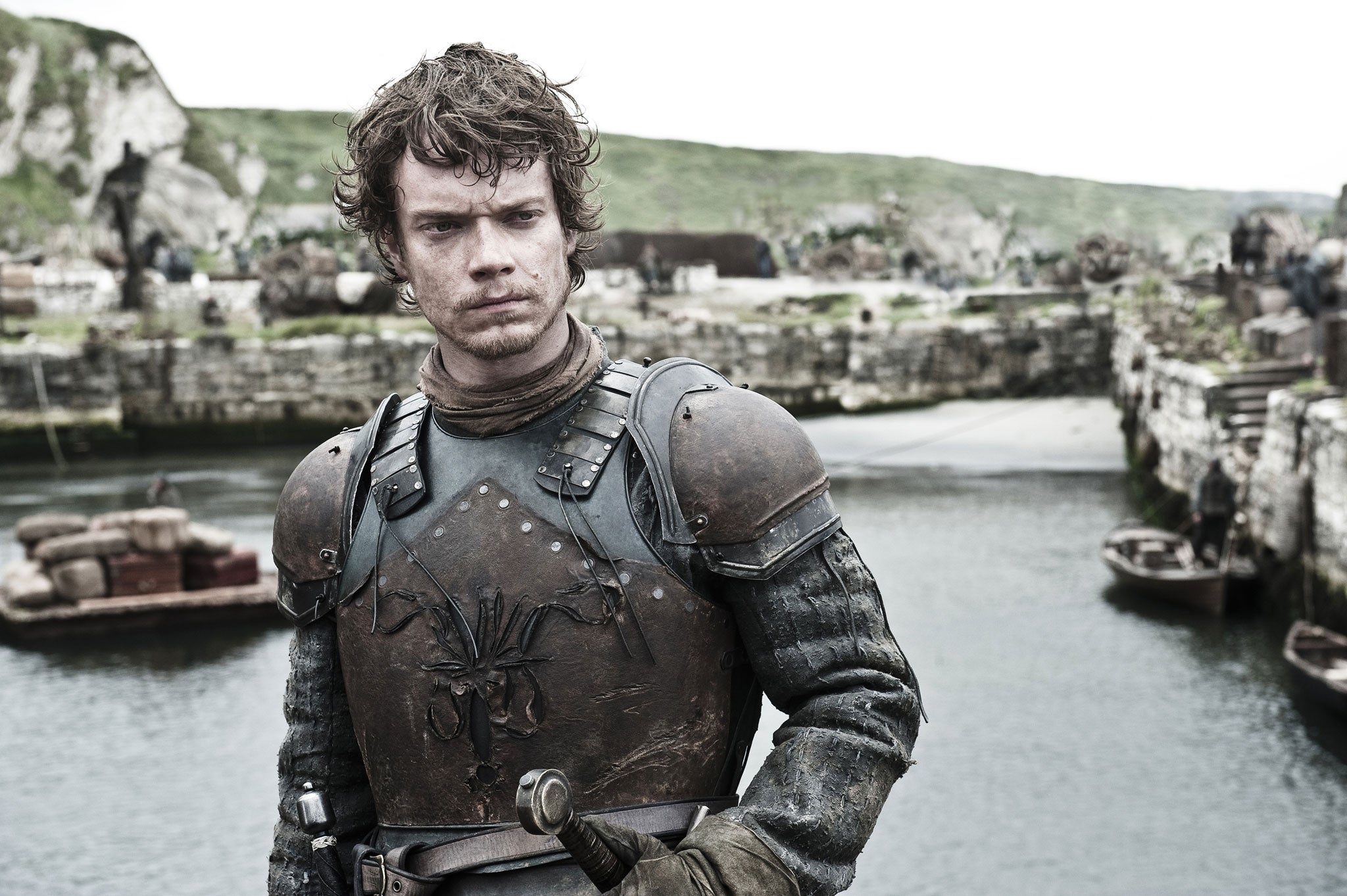Play the man, not the cards.” It’s a credo that goes to the heart of the game of poker – and it’s central to Patrick Marber’s 1995 play Dealer’s Choice, which is being revived at London’s Donmar Theatre this month. Poker is a simple game of statistical probability, but also a complex mesh of psychology and personality, and no one wins by relying on maths alone. In poker, the harder someone tries to make themselves unreadable, the more likely they are to show everything. It’s this sense of enigma that is at the heart of so many of Alfie Allen’s performances, which, in recent years, have encompassed a Tony-nominated turn on Broadway, primetime BBC dramas and acclaimed film roles. There’s a sense of self-containment but also of still waters running deep. It’s no surprise that the play’s producers have cast Allen as Frankie, considered the best poker player among the friends who play a weekly game together in what was Marber’s debut.
Having caught the laddish zeitgeist in its year of release, Dealer’s Choice has proved endlessly revivable; it’s knotty and complex enough to plausibly return and make sense in any number of different eras and contexts. It centres around a group of men – all working in the same restaurant, all struggling with thwarted dreams and all hoping, slightly desperately for something better. They’re united by their poker games; a realm in which they can take responsibility and simultaneously surrender it.
In common with many of the cast members, Allen had never played poker before rehearsals for the play began. But their first revelation was the most important. “We learnt that there’s got to be something on the line for it to matter,” he says. “We were all just betting with fake chips, but we realised that it doesn’t really mean anything unless you’re playing with your own money. And as an actor, that’s definitely at the core of what I try and figure out about every part I play: what’s at stake? There are the obvious things that are at stake in terms of money but you try and dig a little deeper.”

In its Donmar incarnation, the play sits comfortably within the current discourse around masculinity. Allen’s Frankie is a cocky but slightly brittle young alpha-male. He’s not only the best poker player in the group but a prolific ladies’ man to boot. Is there, though, slightly less to him than meets the eye? As the group bickers over the cards, all of them end up unconsciously revealing slightly more about themselves than they’d like.
This is probably not a trait that can ever be applied to Alfie Allen in person. There’s never any danger of him overplaying his hand. When we meet in the Donmar’s Covent Garden offices, he’s unfailingly affable despite a long day of rehearsals – a process he seems to be enjoying every bit as much as the actual prospect of performance. He’s sympathetic and amused rather than irritable when my recording device malfunctions and generous with his time. And yet there’s a slight sense of guardedness about him.

And really, that’s not too surprising. As the son of famously garrulous and unguarded actor, presenter, comic and general overlord of Eighties and Nineties excess, Keith Allen, Alfie learnt about the pleasures and perils of the limelight at a young age. The success – and tabloid-related travails – of his singer-sister Lily presumably drove the point home. Questions about his family elicit lengthy pauses and not much more. You suspect he’s not so much unwilling to talk about them as slightly sick of the questions. “My family is my family, you know?” he says.
What, you suspect, does animate him is his work, which is increasingly both varied and impressive. Dealer’s Choice captures the robust, often combative nuances of male friendship brilliantly. “That’s sometimes how a strong friendship is built,” as Allen puts it. “You can go to the extremes and then kind of go back to ‘actually, we’re alright aren’t we?’ He’s also modest enough to give Marber most of the credit for this. “Patrick’s writing really does the work for you in that respect,” he says. “There are no big, performative monologues in this. It’s always about what the other person is doing. That’s how it becomes a proper dance.”
But it takes two to tango. And more and more, it seems Allen is building a portfolio of vulnerable men in extremis. Alongside Frankie, there’s his wracked, tormented Theon Greyjoy in Game of Thrones (“an amazing, crazy 10 years of my life… that took me to places I didn’t think I could go”). The torture of Theon in the show pivoted around castration, emasculation and humiliation. Last year, Allen played the title role in McVeigh, a timely exploration of America’s deadliest domestic terrorist, Timothy McVeigh, who perpetrated the Oklahoma City bombing in 1995, killing 167 people, including 19 children. And in 2022, there was Steven Knight’s SAS: Rogue Heroes in which he played another real-life character, Jock Lewes, the founding principal training officer of the regiment and a man who combined extreme personal discipline with a maverick streak of wildness.
In realising his screen version of Lewes, Allen did something very characteristic. He offered up a performance that was expressive while being entirely without ego. “I didn’t want to veer too far from the version of him I’d read about – I just looked at the love letters that he wrote to his wife-to-be,” he says. “There’s a whole book of them and that was my source material. I didn’t really want to jazz it up or put my spin on it – I wanted to stay true to what the real life version was”.
It’s tempting here to make a comparison to Alfie’s father Keith, who, for all of his charisma (in fact, probably, because of it), seems to essentially play Keith Allen in every role. Alfie Allen was famously raised in the public eye – Lily has spoken of evenings where the siblings were left upstairs at the Groucho Club while their dad enjoyed himself in the bar downstairs – and has explored the party animal lifestyle himself. But there’s something else in a character like Jock Lewes; a sense of ingrained self-denial that feels like a revealingly antithetical response to this. “Jock was an aloof disciplinarian,” Allen says. “He was raised in a Protestant household, so maybe [the SAS] was his outlet. It gave him a way of channelling his need for structure.” Could something similar be said of Allen himself – and in particular, his ability to disappear into character?

Like the culture itself, it feels like Allen has come a long way. He and Theo Barklem-Biggs (fellow SAS Rogue Hero and one of his co-stars in Dealer’s Choice) set up a therapeutic forum for the cast and crew while on set in Morocco. “There was a bunch of people who didn’t know each other, all plonked in the middle of the desert,” Allen explains. “Which is a bit like what it would be like in the army I guess! It was really good to have that kind of outlet, where everyone felt they could sit around and speak to each other.” For the duration of the run at the Donmar, he and Barklem-Biggs are sharing a flat in central London – there’s a sense of intimacy and honesty, both in and out of character.
So when Allen talks about what’s at stake in the context of Dealer’s Choice, it’s clear that he’s talking about more than money. Dealer’s Choice, like most of the actor’s recent parts, is about how men talk to each other – and in some cases, what happens when they don’t.
But have things moved on since the play was first staged? “I guess they have in terms of talking about love and intimacy and mental health,” he says. “Obviously, I was only eight or nine in 1995 so it wasn’t all that evident to me then but in terms of things being better now, maybe then there was just a kind of unspoken understanding… that sometimes men would just bury things and move on. Whereas now, I think we feel more free to build on that and talk.” In terms of playing the man and not the cards, it feels like Dealer’s Choice – and Alfie Allen himself – has found itself in tune with another cultural moment. He might not be a born gambler. But he certainly isn’t playing it safe either. He’d almost certainly be an excellent poker player, I suggest. “I’d like to think I could be a good bluffer,” he replies. “But it’s all about knowing when to bet.”
‘Dealer’s Choice’ is at the Donmar Warehouse until 7 June


